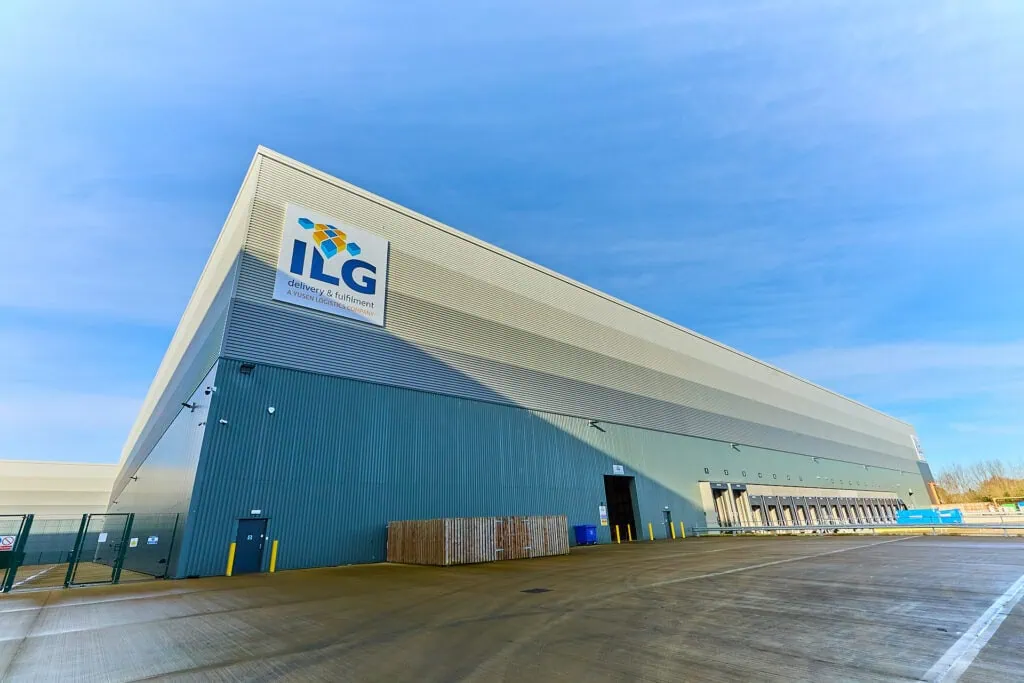
There are more than 4.6 million Shopify-enabled stores worldwide, generating more than $300 billion in economic activity every year (that’s over $35 for every single person on the planet). But what sets the best Shopify stores apart from the rest isn’t in their order value – it’s in satisfied and loyal customers, driven by timely, reliable delivery. That’s where fulfilment comes in.
Many e-commerce operations struggle to get their fulfilment right in-house, which is why they turn to a third-party logistics provider (3PL) for support. This guide explores how partnering with a 3PL who truly understands Shopify can make a real difference to your fulfilment capabilities – and to the happiness of your end customers.
Jump to:
- What is Shopify fulfilment?
- How does Shopify 3PL Fulfilment Service work in practice?
- How can a 3PL help me with my Shopify fulfilment?
- How to choose a 3PL for your Shopify fulfilment
- Partner with ILG for your Shopify fulfilment
- FAQs
What is Shopify fulfilment?
Shopify fulfilment refers to the process of managing orders from Shopify-based e-commerce stores. This includes everything from storage and packaging to the delivery of purchased items, with the aim of not only maximising efficiency and cost-effectiveness, but also meeting customer expectations by delivering the correct and undamaged goods, to the right place, in a timely manner.
There are three main ways to run Shopify fulfilment, each of which suits different types of business:
- In-house: this is where businesses look after Shopify order fulfilment themselves, typically owning or leasing warehouse space and hiring dedicated staff. This is suitable for smaller operations, but often becomes impractical and pressurised as sales volumes grow.
- Drop shipping: under this arrangement, the e-commerce retailer acts as an intermediary, where products are purchased from wholesalers or manufacturers and shipped directly to the end customer. In this scenario, there is no need for the retailer to manage storage, packaging, or shipping.
- Shopify 3PL: Shopify offers its own Shopify Fulfilment Network (SFN). However, many businesses prefer to select an independent third-party logistics provider (3PL) to handle all the key actions involved in Shopify order fulfilment, such as storage, picking and packing, personalisation, and delivery.
How does Shopify 3PL Fulfilment Service work in practice?
In summary, a Shopify fulfilment service operated by a third-party logistics provider will cover the following three steps:
Products are sent to the 3PL
Retailers send their product inventory to the 3PL provider, who will store goods in their warehouses (fulfilment centres). Many 3PL providers can also assist with coordinating the shipment of products from the manufacturer or wholesaler to their facilities, simplifying the logistics process for retailers.
3PLs help you manage and optimise your inventory
Many 3PL providers will have a network of facilities across a country, and some operate in multiple regions, or globally. They will be able to assess sales figures of different products in different markets and work closely with the retailer to distribute the most relevant stock to different fulfilment facilities throughout the network. Redistributing stock proactively in this way can significantly reduce the lead time between a customer’s order and them receiving the delivery.
Orders are shipped from 3PLs direct to customers
When orders are received from a Shopify e-commerce site, the 3PL partner will then pick the items in the warehouse, ensure they’re packaged properly, attach the correct delivery information and labelling, and dispatch the packages to their trusted delivery partner to complete the process.
How can a 3PL help me with my Shopify fulfilment?
Working with a 3PL provider for a Shopify fulfilment service can make a real difference to any e-commerce business. Choosing the right 3PL provider can help:
Even out peaks and troughs in demand
Most retailers experience times of year where demand for their goods is higher than others (for example, Black Friday, Christmas or Chinese New Year. For e-commerce operations, and smaller ones in particular, this can put pressure on in-house warehousing capacity. A 3PL partner can scale warehouse capacity and resource up or down as required, so that inventory management can align with fluctuations in demand while avoiding unnecessary costs.
Relieve admin burden on the in-house team
E-commerce retailers already have enough to manage without losing hours of each day packaging and labelling goods and then sending them out for delivery. Good 3PL partners have the scale and expertise to take care of all these administrative functions, so that retailers and brands can focus on the important parts of growing their business, such as sales and marketing.
Fill gaps in fulfilment infrastructure
Many e-commerce businesses find that they don’t have the infrastructure in place to support them as they grow and scale. One typical pinch point is international shipping, where the need to understand and comply with foreign customs and tax regulations can be complicated and time-consuming. The best fulfilment services for Shopify stores can assess where there are gaps in a retailer’s capabilities, and tailor their offering to meet their needs.
Expand access to different markets
Connected to the previous point, a 3PL provider with worldwide reach will have plenty of expertise and knowledge around shipping and fulfilment requirements in different countries. Being able to remove the complexity and barriers to fulfilling orders around the world can be the key to helping a local e-commerce operation become a truly global one.
Guide more informed inventory decisions
Data and insights can eliminate guesswork in retail operations, helping businesses determine how much stock to purchase and when. A 3PL partner’s warehouse management system (WMS) provides valuable insights through real-time data and tracking. This allows retailers to identify which products are performing well (or underperforming), understand the reasons behind these trends, and make informed inventory decisions.
Improve supply chain efficiency
The data-driven insights a 3PL provider offers can prove critical in identifying problems in the supply chain. For example, if deliveries to a certain area are consistently late, or there are high rates of damaged goods being returned, then the 3PL provider’s WMS can help retailers isolate these issues. This data-led approach enables businesses to take focused, informed actions to remedy supply chain inefficiencies as they arise.
Boost customer experience and satisfaction
All these factors work together to enhance customer satisfaction and brand loyalty. An efficient and professional 3PL partner ensures reliable and timely delivery of products, helping retailers build a strong reputation. By outsourcing fulfilment to a third-party, businesses can reinvest the time and money saved into new product development, and driving strategic growth.
How to choose a 3PL for your Shopify fulfilment
There are plenty of Shopify 3PL providers to choose from; some offer general services while others specialise in specific industries – such as beauty, fashion, or wellbeing. Choosing the right provider can be a difficult process, so from our experience, we recommend considering the following when evaluating prospective partners:
Integrated fulfilment
Integration between Shopify and a 3PL provider’s systems enables seamless, automated workflows, significantly reducing manual effort and the risk of human error in the fulfilment process. Orders placed through Shopify are automatically sent to the 3PL, who handles picking, packing, and delivery. This is typically accompanied by a clear data and audit trail, allowing the retailer’s staff to easily track orders and monitor the fulfilment process. The best 3PL providers will already have this expertise in place, allowing them to quickly and efficiently integrate the solutions with the help of APIs, ensuring the smoothest possible Shopify fulfilment service.
Warehousing for distributed inventory
It may seem that the more warehouses a 3PL provider has, the better their Shopify fulfilment service will be. That level of scale certainly does help, but it’s also important to assess exactly where their facilities are. A brand that sells across multiple countries and regions will need a 3PL partner with facilities in close proximities to these regions. For example, spreading your stock between the UK and EU will mean you can reach your customers across Europe faster than if you just held stock in the UK. . The exact geographical spread of their facilities should therefore be considered when making your decision.
Inventory management support
A good 3PL partner makes inventory tracking and management as easy and insight-driven as possible. This is achieved by combining the provider’s expertise with a warehouse management system that presents key metrics in an easy-to-understand dashboard. This allows retailers to make informed decisions about inventory placement and stock ordering at the right times.
Rapid shipping options
Speed isn’t everything when it comes to delivery, but it remains a crucial part of successful Shopify fulfilment in an era of heightened customer expectation of multiple delivery options. Smaller retailers must compete with global brands and e-commerce giants on delivery speed, price and reliability. A 3PL partner can provide the scale and support needed to offer fast, reliable delivery.
Industry experience and expertise
Goods come in all different shapes and sizes. For example, shipping a piece of heavy machinery or farming equipment is a very different proposition to shipping lighter, smaller items like clothing or beauty products. This is where working with a 3PL provider with industry-specific expertise can be so important, ensuring that the Shopify fulfilment service can be tailored to specific needs, and therefore makes sense for the goods and customers involved.
Partner with ILG for your Shopify fulfilment
Your ideal 3PL provider for Shopify order fulfilment will help you tick all the boxes above – and at ILG, our award-winning combination of experience, expertise and technology does exactly that.
Our web-based Warehouse Management System (WMS) seamlessly integrates with Shopify, allowing you to monitor fulfilment and delivery performance closely. With 100% visibility, customisation options and expert implementation, you can feel confident that your Shopify orders are fulfilled safely, transparently, and on time – every time.
Learn more about our e-commerce 3PL fulfilment services and leverage our expertise and knowledge by partnering with us.
FAQs
Is 3PL for Shopify fulfilment right for every business?
No – it’s essential to speak with any prospective 3PL provider before getting started, discussing your specific business needs and requirements to ensure you can fully benefit from the service. Businesses that may want to avoid using a 3PL include those with limited cash flow, as they might struggle with payments; those with highly specialised or unusual products that require unique shipping and packaging; and those with very small order volumes, who may find it more practical and cost-effective to handle fulfilment in-house.
How much priority should I place on pricing when choosing a 3PL provider?
While it’s important to find a deal that offers value for money, pricing shouldn’t be the only factor in your decision-making process. It’s far more important to ensure your 3PL provider can receive, store, package and ship your goods carefully and efficiently. A good 3PL partner will become an extension of your brand and focus their efforts on your growth and success – this will pay off in the long run by building customer loyalty.
What can a 3PL provider do for me if something goes wrong?
A good 3PL partner will provide a comprehensive support team that ensures your Shopify fulfilment processes run efficiently and smoothly. For example, at ILG, our in-house support engineers are backed by 24/7 service providers and an award-winning customer service account management team, all dedicated to quickly and proactively getting order fulfilment back on track.
Contact Us
Written by Danny Ellard
Joined ILG in 2020 at a time of intensive growth and progressed quickly to lead our UK Sales Team. As well as shaping ILG’s business development strategy for the UK, Danny is hard at work winning new business, tackling ambitious growth targets and strengthening relationships with customers, both new and established. Danny takes a super-collaborative approach to building our forward-thinking fulfilment proposition by engaging closely with ILG’s Leadership, Operations and Marketing teams.
More insights >
How a 3PL Can Prepare You for Chinese New Year Shipping
Chinese New Year has a larger impact on global shipping than you might expect. ILG explains how to prepare for this holiday by partnering with a 3PL provider.
Warehouses vs Fulfilment Centres – What’s the Difference?
Learn the difference between warehouses and fulfilment centres, and how a fulfilment partner can support your brand to succeed and grow. Read ILG’s guide today.

